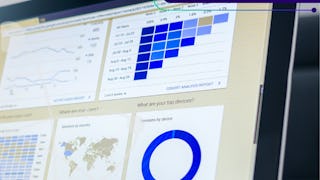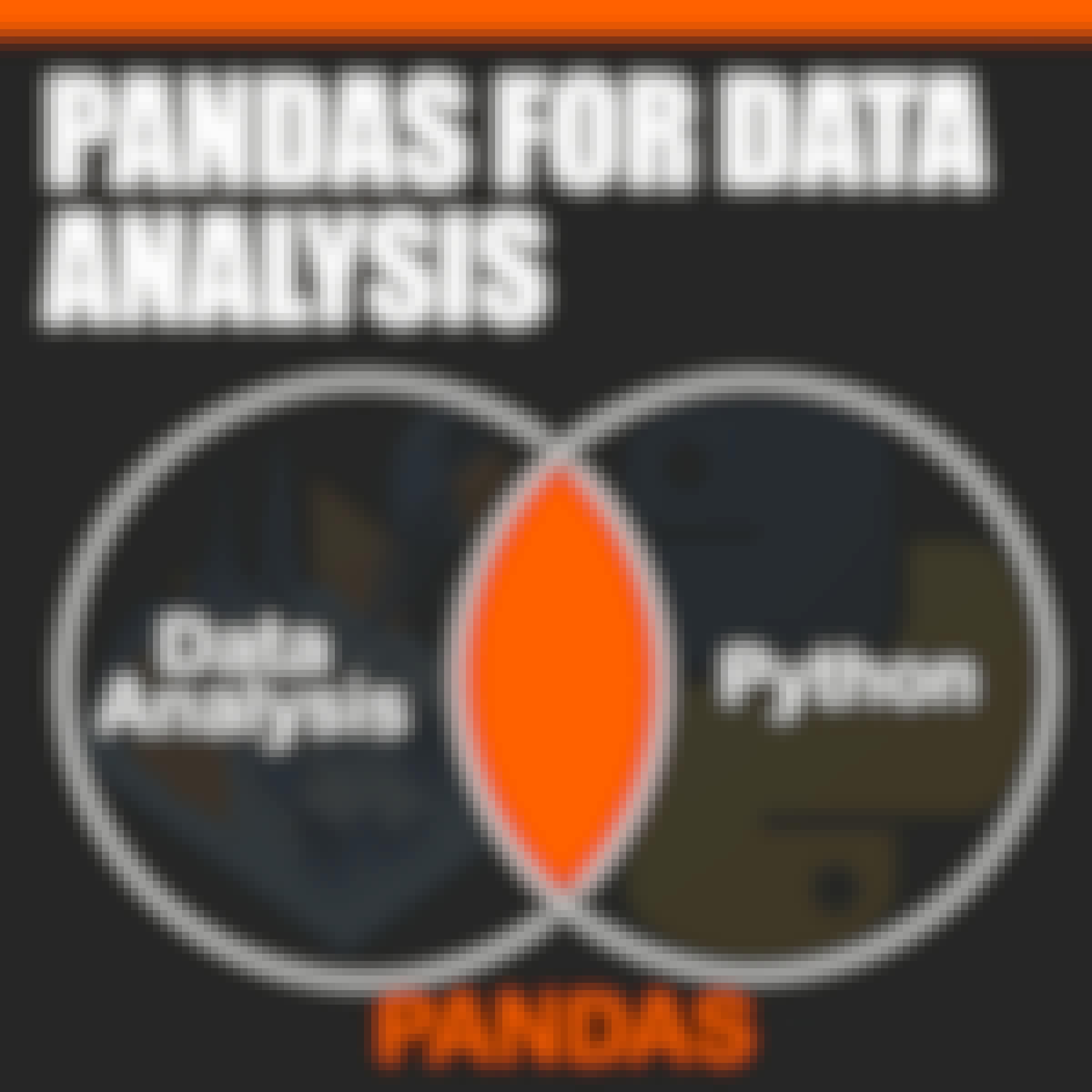- Browse
- Bayesian Statistics
Results for "bayesian statistics"
 Status: NewNewStatus: Free TrialFree TrialJ
Status: NewNewStatus: Free TrialFree TrialJJohns Hopkins University
Skills you'll gain: Algebra, Graphing, Applied Mathematics, Mathematical Modeling, Trigonometry, Probability, Advanced Mathematics, Data Analysis, Logical Reasoning, General Mathematics, Probability Distribution, Mathematical Theory & Analysis, Descriptive Statistics, Arithmetic, Statistics, Engineering Calculations, Calculus, Visualization (Computer Graphics), Geometry, Analytical Skills
Beginner · Specialization · 3 - 6 Months
 Status: Free TrialFree TrialL
Status: Free TrialFree TrialLL&T EduTech
Skills you'll gain: Oil and Gas, Petroleum Industry, Big Data, Data Management, Data Processing, Artificial Intelligence and Machine Learning (AI/ML), Process Engineering, Geostatistics, Anomaly Detection, Image Analysis, Process Control, Production Process, Energy and Utilities, Machine Learning, Automation, Physical Science, Natural Resource Management, 3D Modeling, Exploratory Data Analysis
4.8·Rating, 4.8 out of 5 stars49 reviewsBeginner · Course · 1 - 4 Weeks
 Status: Free TrialFree TrialJ
Status: Free TrialFree TrialJJohns Hopkins University
Skills you'll gain: Tidyverse (R Package), Ggplot2, Data Wrangling, Exploratory Data Analysis, Plot (Graphics), R Programming, Data Import/Export, Predictive Modeling, Data Visualization, Data Visualization Software, Statistical Hypothesis Testing, Data Analysis, Data Manipulation, Data Modeling, Regression Analysis, Web Scraping, Data Presentation, Data Science, R (Software), Data Analysis Software
4.5·Rating, 4.5 out of 5 stars109 reviewsBeginner · Specialization · 3 - 6 Months
 Status: Free TrialFree Trial
Status: Free TrialFree TrialSkills you'll gain: SAS (Software), Data Analysis, Requirements Analysis, Exploratory Data Analysis, Statistical Programming, Data Manipulation, Data Cleansing, Data Transformation
4.8·Rating, 4.8 out of 5 stars94 reviewsIntermediate · Course · 1 - 4 Weeks
 Status: Free TrialFree TrialA
Status: Free TrialFree TrialAArizona State University
Skills you'll gain: Regression Analysis, Experimentation, Statistical Methods, Statistical Analysis, Statistical Modeling, Research Design, Statistical Software, Mathematical Modeling, Analysis, Data Analysis Software
4.7·Rating, 4.7 out of 5 stars67 reviewsIntermediate · Course · 1 - 4 Weeks
 Status: Free TrialFree TrialU
Status: Free TrialFree TrialUUniversidad de los Andes
Skills you'll gain: Data Integration, Data Quality, Exploratory Data Analysis, Data Transformation, Data Cleansing, Data Manipulation, Jupyter, Data Compilation, Data Visualization, Data Analysis, Data-Driven Decision-Making, Data Science, Pandas (Python Package), Predictive Modeling, Python Programming
4.9·Rating, 4.9 out of 5 stars104 reviewsBeginner · Course · 1 - 4 Weeks

Skills you'll gain: Pandas (Python Package), Scatter Plots, Histogram, Data Visualization, Data Manipulation, Data Import/Export, JSON, Data Cleansing, Data Visualization Software, Exploratory Data Analysis, Data Analysis, Python Programming
4.7·Rating, 4.7 out of 5 stars29 reviewsIntermediate · Guided Project · Less Than 2 Hours
 Status: Free TrialFree TrialU
Status: Free TrialFree TrialUUniversity of Colorado System
Skills you'll gain: Linear Algebra, Mathematical Modeling, Estimation, Matlab, Simulations, Engineering Analysis, Applied Mathematics, Control Systems, Time Series Analysis and Forecasting, Probability & Statistics, Statistical Methods, Probability Distribution
4.9·Rating, 4.9 out of 5 stars19 reviewsIntermediate · Course · 1 - 4 Weeks
 Status: Free TrialFree TrialI
Status: Free TrialFree TrialIIllinois Tech
Skills you'll gain: Statistical Analysis, Time Series Analysis and Forecasting, Data Analysis, Machine Learning Algorithms, Data Visualization, Exploratory Data Analysis, Statistical Programming, Statistical Methods, Statistical Machine Learning, Data Cleansing, Analytics, Regression Analysis, R (Software), Statistical Software, Forecasting, Data Science, Statistical Modeling, Supervised Learning, Statistical Inference, Machine Learning
Build toward a degree
4.3·Rating, 4.3 out of 5 stars20 reviewsIntermediate · Specialization · 3 - 6 Months
 Status: PreviewPreviewU
Status: PreviewPreviewUUniversidad Austral
Skills you'll gain: Financial Modeling, Time Series Analysis and Forecasting, Regression Analysis, Financial Forecasting, Predictive Modeling, Finance, R Programming, Financial Analysis, Statistical Analysis, Statistics, Probability & Statistics, Risk Analysis, Microsoft Excel
4.5·Rating, 4.5 out of 5 stars29 reviewsBeginner · Course · 1 - 4 Weeks
 Status: Free TrialFree TrialU
Status: Free TrialFree TrialUUnilever
Skills you'll gain: Data Governance, Data Storytelling, Presentations, Data Visualization, Supply Chain, Data Management, Supply Chain Management, Data Analysis, Data Visualization Software, Data Quality, Analytical Skills, Data Cleansing, Data Collection, Google Sheets, Spreadsheet Software, Pivot Tables And Charts, Exploratory Data Analysis, Data Validation, Risk Management, Problem Solving
4.5·Rating, 4.5 out of 5 stars81 reviewsBeginner · Course · 1 - 3 Months

Skills you'll gain: Data Import/Export, Data Analysis, Exploratory Data Analysis, Java, Data Processing, Data Manipulation, Java Programming, Statistics
4.5·Rating, 4.5 out of 5 stars6 reviewsIntermediate · Guided Project · Less Than 2 Hours
Searches related to bayesian statistics
In summary, here are 10 of our most popular bayesian statistics courses
- Honors Algebra 2: Johns Hopkins University
- AI & ML Applications in Oil and Gas Industry: L&T EduTech
- Tidyverse Skills for Data Science in R: Johns Hopkins University
- Practicing for the SAS Programming Certification Exam: SAS
- Response Surfaces, Mixtures, and Model Building: Arizona State University
- Integración y preparación de datos: Universidad de los Andes
- Data Analysis in Python: Using Pandas DataFrames: Coursera
- Kalman Filter Boot Camp (and State Estimation): University of Colorado System
- Introduction to Data Science Techniques: Illinois Tech
- Modelización Cuantitativa para Finanzas Corporativas: Universidad Austral










